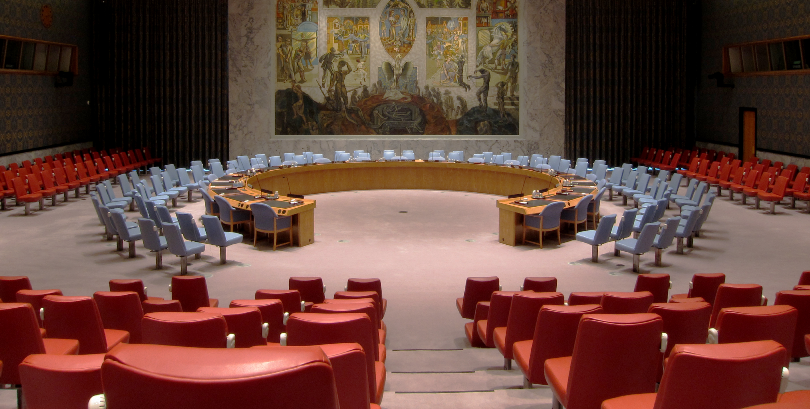First US Sponsored Israel-Gaza UN Resolution Vetoed by China and Russia
ON 03/23/2024 AT 04 : 31 AM

The United States introduced its first resolution calling for a temporary end to Israel’s mass killing in Gaza to the United Nations Security Council this week with much fanfare prior to the vote.
In the days prior to the submission of the final wording for the proposal, U.S. Secretary of State Antony Blinken declared that he and Israeli President Isaac Herzog were actively discussing the draft proposal as a high-priority topic during his Middle East trip this past week.
He also said he and Herzog, plus separately Prime Minister Benjamin Netanyahu, had also talked about the ongoing ceasefire negotiations still proceeding in Doha, Qatar, with Hamas and Israeli Mossad representatives alternately attending the negotiations sponsored by Egyptian and Qatari representatives there.
In all those discussions, Blinken reasserted Joe Biden’s insistence that their goal was to put in place "a ceasefire of at least six weeks".
According to Matthew Miller, a State Department spokesperson, such a ceasefire would “secure the release of hostages and enable a surge of critical humanitarian assistance into Gaza", in addition to pausing the continuously rising numbers of innocent Palestinians murdered and wounded by Israeli Defense Forces in Gaza.
"Secretary Blinken reaffirmed the US commitment to Israel’s security and the lasting defeat of Hamas, while emphasizing the need for Israel to take all possible measures to protect Palestinian civilians in Gaza – including through the prompt, effective facilitation of critical humanitarian assistance throughout Gaza,” Miller continued.
"The secretary also underscored the US commitment to securing lasting peace and stability in the region," Miller said in closing his comments about the plans.
As those discussions eventually solidified into the United States finally submitting its non-ceasefire resolution to the UN Security Council on March 21, with a vote planned for the next day, it became clearer how watered down the resolution had become.
In its final form, rather than demanding a ceasefire in Gaza as some Biden administration officials had attempted to indicate, it instead spoke of “the imperative of an immediate and sustained ceasefire to protect civilians on all sides, allow for the delivery of essential humanitarian assistance, and alleviate humanitarian suffering.”
Consistent with its avoidance of asking for even a short term pause in ongoing killing, the proposal also did not set a deadline for when a ceasefire should happen, did not demand a length of time for how long it should last, or whether it would be part of a long-term solution to peace in Gaza.
In return for having such a ceasefire, if passed it would provide for the “unequivocal” backing for “such a ceasefire in connection with the release of all remaining hostages”, apparently from both sides.
The resolution also spoke of the need to keep civilians protected from harm in the ongoing war, as well as for ensuring more humanitarian aid gets into Gaza. Both statements were made with no measure of how that would happen and what Israel’s specific role would be in doing so.
The measure did not call out Israel for its genocidal destruction of the Palestinians and their homeland. It also did not demand that Israel put its planned ground assault on Rafah, a violent move which Joe Biden and his emissaries have condemned again and again. Instead, it used Israel’s name in the document only once. That came up only in the context that the only good solution when the war was over was the “two-state solution”, something Israel has always rejected publicly during the phase of Israel’s war against Hamas and the Palestinian people which began on October 7.
The U.S. resolution also continued its avoidance of condemning anything about Israel’s actions in a clause which appeared more about placating Israel than anything else. That section asked the Security Council membership to condemn “all acts of terrorism, including the Hamas-led attacks of October 7, 2023,” along with the “taking and killing of hostages, murder of civilians, and sexual violence including rape.” That condemnation also included wording criticizing Hamas’ alleged use of Palestinians as “human shields”, and their homes, hospitals, schools and more as hideouts, without making any reference to the growing evidence that much of the human shield allegation against the resistance is false while the Zionists have indeed blatantly used human shields.
The resolution did not have a single statement condemning Israel for its grotesquely disproportionate response to the October 7 events by using it as an excuse for the mass genocidal destruction of the Palestinian people in Gaza, which to date has resulted in the slaughter of over 31,000 Palestinians and tens of thousands wounded.
When the Security Council finally voted on the matter, Russia and China, two of the five permanent members on that body, vetoed the measure.
In his statements to the council regarding his country’s vote, Russian UN Ambassador Vassily Nebenzia expressed disgust with the document submitted to the group for a vote.
It attacked it first for being more about politics than anything of substance. He also said the measure as written authorized an “effective green light” for Israel to proceed with the final phase of murders and destruction which would occur when Israel began its ground assault on Rafah. He then pointed to the lack of any direct call for a ceasefire now, something which at least might have justified discussing the proposal further.
Nebenzia noted further that in crafting the resolution, the United States was guilty of “deliberately misleading the international community” in what it said the resolution was about.
A statement released separately from the Kremlin called out the White House leadership for orchestrating a “hypocritical spectacle” which might appear to say all the right things and yet would not push Israel to make any changes in its actions.
The People’s Republic of China was equally dismissive of the lack of substance in what the U.S. had put forward to the Security Council for approval.
Zhang Jun, its UN representative at the council, said the U.S. had, via the use of intentionally “ambiguous” language, had “dodged the most central issue, that of a ceasefire”. He also said the proposal did not “even provide an answer to the question of realizing a ceasefire in the short term.”
While the vetoes of Russia and China were the active reasons why the U.S. resolution did not pass, perhaps the strongest message to the U.S. on what just happened came from an unexpected source: Guyana, one of the non-permanent members of the council.
“After five months of war in Gaza, and the horrific attacks of 7 October 2023, this council has still not been able to adopt a text that addresses all the dimensions of the conflict, in a manner that impacts the situation on the ground and upholds the rule of law,” said Guyana Ambassador Carolyn Rodrigues-Birkett to others on the council.
“Contrary to some media and other reports, this resolution does not call for an immediate ceasefire,” she continued. “Instead, we note that it, and I quote, ‘determines the imperative for a ceasefire,’ end of quote, and calls for support for diplomatic efforts that are ongoing outside of the United Nations.”
“The demand for a ceasefire should not be linked to, or conditioned on, the release of hostages,” she went on. “Two wrongs cannot make a right, and the Palestinian people cannot be collectively punished and themselves held hostage for the crime of others. While the draft includes the condemnation of Hamas for the October 7 attacks and demands they immediately grant humanitarian access to the hostages, and rightfully so, there is no attribution or demand to the Israeli authorities for what is taking place in Gaza.”
“We have heard briefer after brief, both from the UN system and civil society, describe the situation on the ground, explaining where the problems are and who is responsible for creating these problems. Why then were the relevant demands in the resolution not clearly addressed to the occupying power [Israel]? Not even once was this done,” she explained.
“Indeed, if one were to read this resolution without background knowledge, it would be difficult to ascertain which party in this conflict is committing the atrocities in Gaza, atrocities which necessitated this draft resolution being put forward. In a resolution of 41 paragraphs — 2,036 words — the occupying power [Israel] is mentioned [only] once, in the penultimate paragraph,” the Guyana Ambassador added.
Guyana voted to abstain from voting for or against the U.S.-draft resolution.
After the vote was taken, Linda Thomas-Greenfield, the U.S.’s pathetic ambassador to the United Nations, targeted Russia as the reason for blocking what she represented as a positive move forward by the Council, without making any reference to how it had been the United States which blocked all previous and mostly far-more substantive resolutions calling for ceasefires and other actions. She said the Russian Federation had chosen to attack the U.S. based on a political agenda rather than because there was anything wrong with what was proposed.
In a press conference in the U.S. later yesterday, disgusting U.S. National Security Council spokesperson John Kirby came after both Russia and China with disagreeing with the proposal solely because it originated from the White House.
Moments after the vetoes were recorded, French President Emmanuel Macron announced from Brussels at European Union leaders’ event that he would immediately “resume work on the basis of the French draft resolution in the Security Council and work with our American, European and Arab partners to reach an agreement.”
While that attempt may reach the Security Council floor soon for debate and another vote, any resolution which explicitly calls for an immediate ceasefire by all parties, along with support for a two-state solution and the cancellation of Benjamin Netanyahu’s plans for his “ultimate victory” against Hamas, will almost certainly be vetoed by the United States. The Zionist White House will continue to ensure that the genocide continues.
 Asiabiznews
Asiabiznews